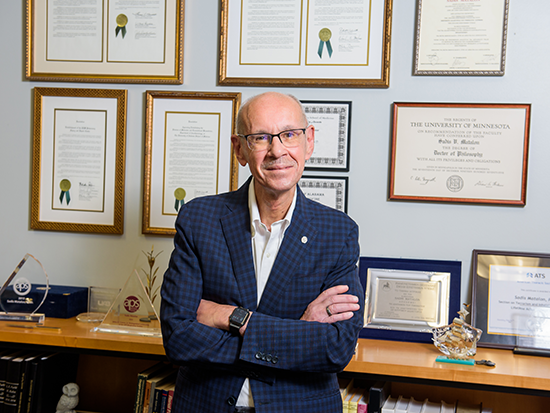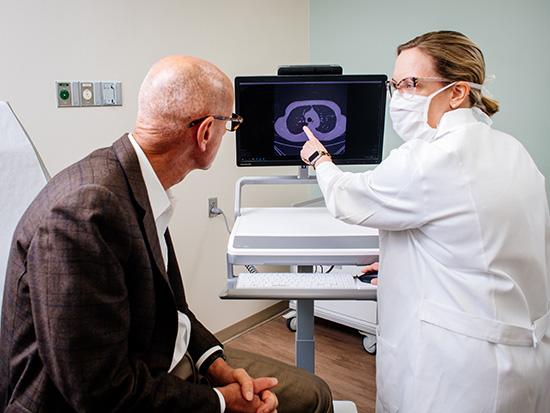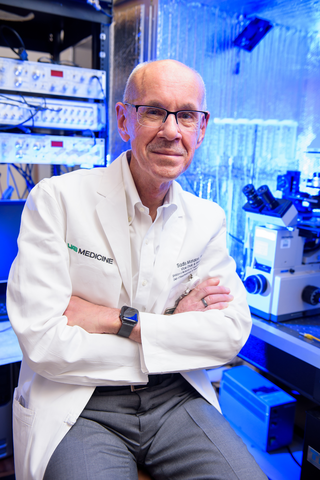Media contact: Brianna Hoge
 Photography: Nik LaymanTwenty-two years ago, Sadis Matalon, Ph.D., distinguished professor and vice chair of Research in the University of Alabama at Birmingham Marnix E. Heersink School of Medicine’s Department of Anesthesiology and Perioperative Medicine, was diagnosed with renal cell carcinoma, commonly known as kidney cancer, in his right kidney. This would prove to be the first of several medical crises in store for Matalon, a renowned scientist who holds the Alice McNeal Endowed Chair in Anesthesiology and serves as the editor of Physiological Reviews. His characteristic resilience was just getting revved up, but his research career did not falter.
Photography: Nik LaymanTwenty-two years ago, Sadis Matalon, Ph.D., distinguished professor and vice chair of Research in the University of Alabama at Birmingham Marnix E. Heersink School of Medicine’s Department of Anesthesiology and Perioperative Medicine, was diagnosed with renal cell carcinoma, commonly known as kidney cancer, in his right kidney. This would prove to be the first of several medical crises in store for Matalon, a renowned scientist who holds the Alice McNeal Endowed Chair in Anesthesiology and serves as the editor of Physiological Reviews. His characteristic resilience was just getting revved up, but his research career did not falter.
Diagnosis of kidney cancer
Matalon is an avid bicyclist. He began his cancer journey in 2001 when he returned home one day from a biking trip and noticed blood in his urine. He immediately contacted his urologist at UAB Medicine, who found a kidney stone in his left kidney and cancer in his right kidney. He was referred to surgery to get his right kidney removed and has been living with one kidney ever since.
“Within a week of my procedure, I felt fine,” Matalon said. “I was able to exercise regularly and continue my regular work week.”
Back to life
Three years ago, Matalon was not feeling well, so he told his wife he was going to lie down earlier than usual.
“My wife figured something was wrong because I typically do not sleep in the middle of the day,” Matalon said. “I was having a heart attack, and my wife found me unconscious. She is a registered nurse and took steps to bring me back to life.”
Matalon’s wife, Lee Ann Riesenberg, Ph.D., professor and associate director of Education in the Heersink School of Medicine’s Department of Anesthesiology, performed CPR and called 911. He received several stents in his left coronary artery and was in the intensive care unit for about two weeks.
A week after that, he was again back at work, conducting research in lung diseases, mentoring students, writing grants, serving as editor of Physiological Reviews and fulfilling his research duties.
“When I was in the ICU, given my condition, people thought I would die,” Matalon said. “But I wanted to live to continue my research with the hope that it will help other people. Other than the doctors, I have to thank my wife; she really saved my life."
“When I was in the ICU, given my condition, people thought I would die,” Matalon said. “But I wanted to live to continue my research with the hope that it will help other people. Other than the doctors, I have to thank my wife; she really saved my life. Cardiac arrest has extremely high mortality, and if she hadn’t known how to perform CPR, I would not be here today.”
A second cancer diagnosis
About a year and a half ago, Matalon noticed a mass in his right arm.
“I got excited — I was very proud of myself that I had developed another muscle,” Matalon said. “The problem was that it felt funny because it was only in one arm. After a few days, it started to hurt, and I knew something was wrong.”
Matalon immediately called his colleague Peter Nagi, M.D., associate professor and a pain medicine specialist at UAB. Nagi recommended Matalon consult with doctors in the O’Neal Comprehensive Cancer Center at UAB.
Within a day, Ashley Holder, M.D., at the time the chief of the Section of Melanoma and Sarcoma Surgery, scheduled an appointment. She conducted an MRI and found the mass to be suspicious.
“I cannot believe how quickly Dr. Holder diagnosed it,” Matalon said. “After a few days had passed, we had confirmation from pathology that it was a malignant sarcoma.”
Matalon’s request was to conduct surgery to remove the cancer, but his surgeon recommended another option. “She explained that we would use radiation to shrink the tumor first and remove it afterward to avoid extensive surgery.”
Holder referred Matalon to Samuel Marcrom, M.D., a radiation oncologist at the O’Neal Comprehensive Cancer Center and assistant professor in the UAB Department of Radiation Oncology. Marcrom prescribed six weeks of radiation therapy, five days a week.
“Dr. Marcrom is a knowledgeable and compassionate physician who spent a long time outlining the best course of treatment,” Matalon said. “Taking his recommendation, for the next six weeks, I went to 10-minute radiation therapy sessions five days a week at 6:30 a.m. Even when I was scared, my care team reassured me and motivated me every step of the way. I cannot speak highly enough of the people who treated me at the cancer center.”
A few weeks after his radiation therapy ended, Matalon got another MRI. The radiation treatment had been successful, and Matalon was ready for surgery.
 Chest CT without contrast showing no evidence of pulmonary metastases, one year post radiation and surgical excision.
Chest CT without contrast showing no evidence of pulmonary metastases, one year post radiation and surgical excision.
Photography: Steve Wood
Doctor-patient relationship
When Matalon was waiting to be taken into the operating room, he learned he had been elected as a corresponding member of the National Academy of Athens, one of the oldest research institutions in Greece. This is one of the highest honors a scientist of Greek descent can receive.
A few days later, Matalon got the call he was waiting for. He was informed that there was no evidence of cancer in the area surrounding the tumor.
“This was the best news I could have received, and I am so grateful to Dr. Holder and Dr. Marcrom for providing the best possible care,” Matalon said.
Matalon had follow-up tests every three months to make sure the cancer had not recurred or spread to the lungs.
“Thanks to my doctors and the advanced treatment capabilities available at UAB Medicine and the O’Neal Comprehensive Cancer Center, it has been a year and a month that I have been cancer-free.”
“I was so thankful to be treated by Dr. Holder and others at the O’Neal Comprehensive Cancer Center at UAB,” Matalon said. “Everyone at UAB works collaboratively to make sure patients like me have the best care available. I did not feel like just another patient. I felt that my care team cared for and invested in me every step of the way.”
 Photography: Nik LaymanCommitment to excellence
Photography: Nik LaymanCommitment to excellence
Matalon has always been driven to achieve. He grew up in Greece and was awarded a Fulbright Scholarship to study physics at Macalester College in St. Paul, Minnesota. After graduating, he enrolled in the Department of Physics at the University of Minnesota, where he earned a master’s degree, which led him to receive his Ph.D. in physiology. He has been conducting research in lung diseases since 1976.
Despite the intense treatments for two cancers, a heart attack and multiple surgeries, Matalon has never stopped conducting his research. He is motivated by the hope that his research will help save lives and make a difference in the quality of life for all, he says.
Matalon’s research has been funded by the National Institutes of Health, the American Lung Association, Department of Defense and other agencies since 1978. His work has been published in more than 360 publications and has 18,000 bibliographic references. He is the owner of five international patents for treatments for acute lung injuries caused by viral infections and exposure to toxic gases. Matalon received multiple awards, including the Career Investigator Award from the American Lung Association, the NIH MERIT Award, the Recognition Award for Scientific Accomplishment by the American Thoracic Society and two Honoris Causa degrees from the University of Thessaly and the National and Kapodistrian University of Athens, Greece. He has received numerous awards for his teaching of medical students.
At 74 years old, he has no plans to retire anytime soon. “I want to serve as long as I can, and I hope that my work continues to make a difference in people’s lives,” Matalon said.